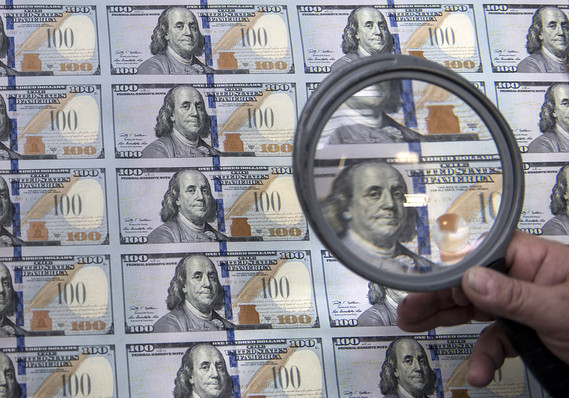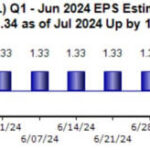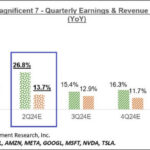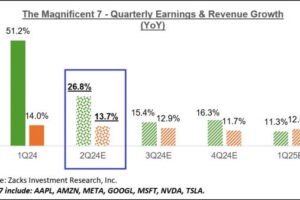 BRENDAN SMIALOWSKI/AFP/Getty Images)
BRENDAN SMIALOWSKI/AFP/Getty Images)
Perhaps you’ve heard or read something recently about Modern Monetary Theory. You’d have to be living on the Space Station not to have come in contact with the “theory,” as it were, that is sweeping the nation, aided and abetted by progressive members of Congress in their push to guarantee free everything.
Modern Monetary Theory, or MMT, is based on the notion that deficits don’t impose any constraints on countries that borrow in their own currency, such as the U.S. or Japan.
MMTers believe that adjustments to aggregate demand are the province of fiscal policy; that the government can spend money on public priorities, such as keeping everyone employed, without raising revenue; that the only limit on government spending is inflation; and that interest rates should be permanently set at zero.
If this sounds fanciful, it is. Even the name — Modern “Monetary” Theory — is misleading because it’s really fiscal policy in disguise. Instead of the Federal Reserve acting to stimulate or curtail economic growth by lowering or raising interest rates, MMT delegates that role to the federal government, which would increase spending to address weak aggregate demand and raise taxes to curtail rising inflation.
The economic establishment, both right and left, has come out against MMT with guns ablazing, calling it quackery, arguing that monetary policy is best left to the real monetary authority.
Isn’t this a replay of the age-old Friedman v. Keynes debate? That would be Milton Friedman, free-market economist and father of monetarism, and British economist John Maynard Keynes, who proposed using government intervention to stabilize the economy.
Keynes proposed using government spending to increase aggregate demand in order to temper the downturns in the economy. His suggested countercyclical fiscal policy, including spending on public-works projects at times of high unemployment, and raising taxes to slow economic growth when inflation was accelerating.
Keynesianism dominated economic thinking from the 1950s to the 1970s, when the U.S. confronted both high unemployment and high inflation. Stagflation gave rise to the acceptance of Friedman’s monetarist ideas: that inflation is a monetary phenomenon; that an increase in the money supply affects nominal spending in the short run and inflation in the long run.
“MMT has many Keynesian aspects to it,” said Scott Sumner, a senior research fellow at George Mason University’s Mercatus Center. “You boost spending to boost GDP growth. Keynesians say you prevent inflation by tight money. MMTers say you raise taxes.”
Sumner pointed to a real-world case study of MMT that failed miserably.
“In 1968, (President) Lyndon Johnson raised taxes,” which produced a budget surplus in 1969. “But raising taxes and balancing the budget didn’t control inflation.”
Inflation rose steadily, peaking at 6.4% in February 1970, shortly after the onset of recession, as the Fed got serious about raising interest rates to curtail rapid growth in the money supply.
“There is no statistical evidence that fiscal policy drives inflation,” Sumner said. “We have huge deficits now and no inflation.”
What seems to be getting less attention than the questionable economics of MMT are the mechanics. MMTers seem to gloss over the issue of how the government’s spending initiatives would be financed. Yes, the Treasury can deposit a check in the bank account of a contractor hired to improve the nation’s infrastructure, but what happens when the Treasury’s accounts run dry?
MMTers assume that the Fed will accommodate the spending by printing money. That could be accomplished in one of two ways: by buying bonds directly from the Treasury, which is a practice employed by banana republics that almost always ends in hyperinflation; or by extending a permanent overdraft loan to Treasury General Account at the Fed.
Too bad there are legal constraints on both of those tactics.
First, Section 14b of the Federal Reserve Act specifically grants federal reserve banks the power “to buy and sell in the open market” U.S. Treasury securities or government-guaranteed debt obligations. Nothing in there about buying bonds directly from the Treasury.
Second, “there is no allowance for overdrafts at all,” said George Selgin, director of the Center for Monetary and Financial Alternatives at the Cato Institute. “It’s illegal. Congress can’t write checks in amounts exceeding its balances in its TGA account.”
“When you push MMTers on the question of what happens when spending can’t be financed out of current resources from taxing and borrowing, they assume the Fed, without question, will fund the difference,” he said. “That presumes that the laws will be set aside. That’s a huge assumption.”
While MMT supporters, such as New York Democratic Congresswoman Alexandria Ocasio-Cortez, may have the energy and the social media presence to promote their pet ideas, it’s not clear that progressive Democrats have the votes to amend the Federal Reserve Act or rewrite banking laws.
Then there’s the idea of minting a $1 trillion platinum bullion coin, which the Treasury would deposit in its account at the Fed: another questionable tactic that would require the endorsement of both the U.S. Mint and the Fed. First proposed as a work-around during a debt-limit crisis, MMTers have now co-opted the idea as their own. (You can read Selgin’s blog post to understand the intricacies of coinage.)
Finally, there is the small matter of ceding control of the economy to Congress.
MMTers may believe their hype about what drives inflation and what should be used to control it, but why, oh why would anyone assign the most important economic-management function to the political class? These are the same folks who can’t seem to pass a budget on time or address the nation’s crumbling infrastructure when they all agree it needs fixing?
This seems to be a major flaw in Modern Monetary Theory. The economy is too important to be left to the politicians.















Add Comment